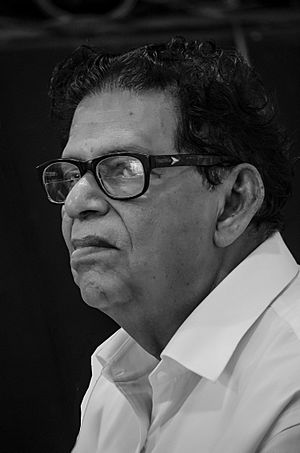Chemmanam Chacko facts for kids
Quick facts for kids
Chemmanam Chacko
|
|
|---|---|
 |
|
| Born | 7 March 1926 Mulakulam, Travancore |
| Died | 15 August 2018 (aged 92) Kochi, Kerala, India |
| Pen name | Chemmanam |
| Occupation | Poet, social worker |
| Nationality | Indian |
Chemmanam Chacko (Malayalam:ചെമ്മനം ചാക്കോ) was a famous Indian poet. He was known for his funny and clever poems. He used his poems to talk about important things happening in society and politics. He was born on March 7, 1926, in Kerala, India. He lived a long life and passed away on August 14, 2018, when he was 92 years old.
Chemmanam Chacko's Early Life
Chemmanam Chacko was born in a village called Mulakulam. This village was part of a place called Travancore back then. His family name was Chemmanam. His father was a Christian priest.
He went to school at Saint Joseph's school in Piravom. Later, he studied Malayalam literature at University College, Trivandrum. He was very good at his studies and got the top rank! After finishing college, he became a professor. He taught at Mar Ivanios College and the University of Kerala.
Chemmanam Chacko's Poetry
Chemmanam Chacko wrote his first poem, 'Munnottu' (which means 'Forward'), in 1946. It was published in a local newspaper. But he became really well-known in 1967 with his poem 'Kanakaaksharangal' (meaning 'Golden Letters').
Chemmanam Chacko was famous for using satire in his poems. Satire is a way of using humor, irony, or exaggeration to make fun of or criticize people's mistakes or foolishness. He used this style to comment on social and political issues. Many people compared his poetic style to an older Malayalam poet named Kunjan Nambiar.
In 1977, his collection of poems called Rajapatha won the Kerala Sahitya Akademi Award. This is a very important award for writers in Kerala. In 2006, he received a special lifetime achievement award for his amazing work in literature from the Kerala Sahitya Akademi. He also won the Mahakavi Pandalam Keralavarma Award in 2014 and the Asan Prize in 2015.
A List of His Books
- Vilamparam (Proclamation) (1947)
- Kanakaaksharangal (Golden Letters) (1967)
- Nellu (Rice) (1968)
- Innu (Today) (1969)
- Puthari (Fresh Rice) (1970)
- Asthram (Arrow) (1971)
- Agneyaasthram (Fire-arrow) (1972)
- Dukkhanthinte Chiri (Laughter of sorrow) (1973)
- Aavanazhi (Quiver) (1974)
- Jaithrayaathra (Victory Parade) (1975)
- Rajapaatha (Royal Path) (1976)
- Daahajalam (Water for Thirst) (1981)
- Bhoomikulukkam (Earthquake) (1983)
- Ampum Villum (Bow and Arrow) (1986)
- Raajavinu Vasthramilla (King is naked) (1989)
- Aalilla Kaserakal (Empty Chairs) (1991)
- Chinteru (Plane - as in tool for timber work) (1995)
- Narma Sankadam (Light Sadness) (1997)
- Onnu Onnu Randaayiram (1-1-2000) (2000)
- Ottayaal Pattaalam (One-man Army) (2003)
- Ottayaante Choonduviral (Pointing finger of a lone Elephant) (2007)
- Akshara Poraattam (War of Words) (2009)
- Akshara Poraali (Warrior of words) (2010)

